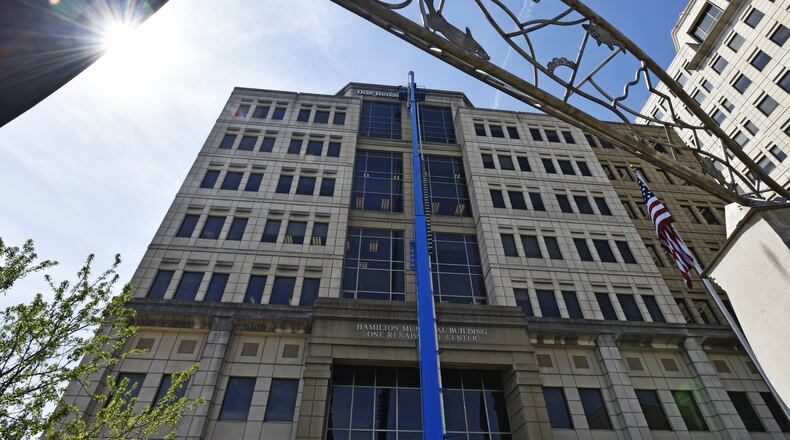For 2025, Jones and his staff are budgeting income taxes collections at $36 million to “try to stay conservative with our numbers.” The city budgeted $35 million in 2024.
The chief fiscal officer said the city needs to monitor income taxes and general fund expenses “because if they remain flat, we’re going to have to make up that difference.”
Jones and his staff are not worried about the flat collection given past record years in collections, with Jones saying “you’re not going to do that every year ... but as we look out into ‘27 and ‘28, we need to keep an eye on that” given that Hamilton’s levy funds won’t increase and the city wants to keep reimbursements from its utilities for chargebacks low.
The municipal income tax is the city’s largest source of revenue, and it had seen some sizeable jumps in prior years, such as going from $31.65 million in 2021 to $35.2 million in 2022, and then to $37.79 million in 2023.
Overall, the $61.6 million general fund expenditure budget will be up 4.37% over the 2024 adopted budget, Jones said.
Street paving will continue to be a focus in 2025, Jones said, and the general fund will help the city take a “proactive approach” with the effort. They plan to transfer a little more than $1.1 million to the Infrastructure Renewal Fund.
Hamilton Executive Director of Infrastructure Edwin Porter said infrastructure fund expenses will increase 7 percent in 2025 compared to this year and street maintenance will be the largest portion of it.
There are 18 streets slated to be part of the city’s capital resurfacing projects, which will be paid through either Street Levy, Ohio Public Works Commission or Ohio Department of Transportation funds, or the general fund. Five of these streets ― parts of Lincoln Avenue and 11th, 12th, 13th and South 14th streets ― will be in the Jefferson neighborhood.
Hamilton is putting redevelopment focus in the Jefferson neighborhood, including working with Neighbor Housing Services of Hamilton to construct three new homes to begin addressing the lack of affordable housing in the city. City Manager Craig Bucheit previously told the Journal-News, “One of our key strategic priorities is being neighborhood-focused while continuing to drive development and maintain the momentum of revitalization.”
Another infrastructure expense will be with stormwater, which will see a nearly 9% increase now that the new rate plan is in place, Porter said.
“We’re going to be spending money to do more proactive inspections and maintenance of the system,” Porter said.
Two large stormwater projects, totaling $1.5 million, will be at Heaton Street at Beckett Street, and those improvements will support the redevelopment at the former Beckett Paper site, Porter said.
Also, $900,000 will be spent in support of the concrete repair and resurfacing program.
“As we’ve had additional resurfacing in our community, we’re improving our stormwater at the same time to make sure we have good infrastructure as we have new paving,” Porter said.
The citywide budget, also known as the all-funds budget, for 2025 is almost $419.7 million, up around 9.5% over the 2024 adopted budget. The increase is because of several projects planned for the upcoming year. Some departments, such as the utility department, pay for many projects through charges for services. Some projects are grant-funded and others are debt-funded.
Some of the big-dollar expenses in 2025 are capital projects, like $3.5 million for the Dixie Highway/Belle Avenue intersection improvement in front of Darana Hybrid’s expansion. That includes about $2.5 million in borrowed funds. There’s also the Millville Avenue resurfacing project, which comes in at more than $1.8 million.
Two other infrastructure projects are set to happen in 2025, including phase 4 of the Beltline Recreational Trail which comes in at nearly $855,400, and Safe Streets for All grant, which requires a $750,000 city match.
In electric, there’s $3 million budgeted for Hamilton Enterprise Park improvements that serves critical infrastructure users, such as hospitals and manufacturers, “so what this will do is it will underground additional electric in this area and it will also allow to be served from multiple substations, so it’s adding redundancy and making the system more robust in Hamilton Enterprise Park. But this is projected to be spent from fund balances, not revenues for the year, Porter said.
Hamilton City Council is expected to vote on the 2025 city budget at Wednesday’s 6 p.m. meeting at 345 High St., which is the last regularly scheduled meeting of the year.
INCOME TAX REVENUES
Here is what the city of Hamilton had received in income tax revenues from 2021 to 2023, what it’s projected to receive by the end of this year for 2024 and what it expects to receive in 2025.
2021 (actual): $31.65 million
2022 (actual): $35.18 million
2023 (actual): $37.79 million
2024 (projected): $37.5 million
2025 (proposed): $36 million
Source: City of Hamilton Finance Department
About the Author


